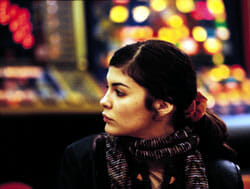Dirty Pretty Things

Avoiding familiar common postcard views of London, Stephen Frears makes Dirty Pretty Things a tour through shady dealings and sufferings that could be set in any big city on either side of the Atlantic. It’s a contemporary nightmare. We are drawn into the daily desperation of overworked immigrants—legal and otherwise—who survive by doing the world’s dirty work.
Frears, who surprises us with something new every time, cleverly dodges the curse of social dilemma films. Weaving threads of classic thrillers through this gritty realistic context, he satisfies our desire for a good story—for intrigue, suspense, humor, big revelations and a tantalizing possibility of romance—even as he educates us about the evils occurring right under our noses. The hero’s conscience leads him into an underworld that recalls Blue Velvet and into a relationship that echoes Casablanca.
Okwe (Chiwetel Ejiofor, stoic and slow-burning) is a Nigerian immigrant hiding from immigration police while he works several wearying jobs. In Nigeria, he was a respected doctor. Here, he’s a secretive superhero—taxi driver and janitor by day, hotel clerk by night, undercover physician in the off-hours. To help his persecuted kindred, he takes advantage of being overlooked, pocketing drugs while he sweeps hospital floors. When exhaustion gets the upper hand, he takes refuge in the apartment of his beautiful co-worker, Senay (Audrey Tautou, half-convincing as an English-speaking Turkish immigrant), and at the morgue, where his chess partner, Guo Yi, works (Benedict Wong, the quick-witted comic relief.)
-

-

-

-

-

-

-

-

-

-

-

-

-

-

-

-

-

-

-

-

-

-

-

-

-

-

-

-

-

-

-

-

-

-

-

-

-

-

-

-








































